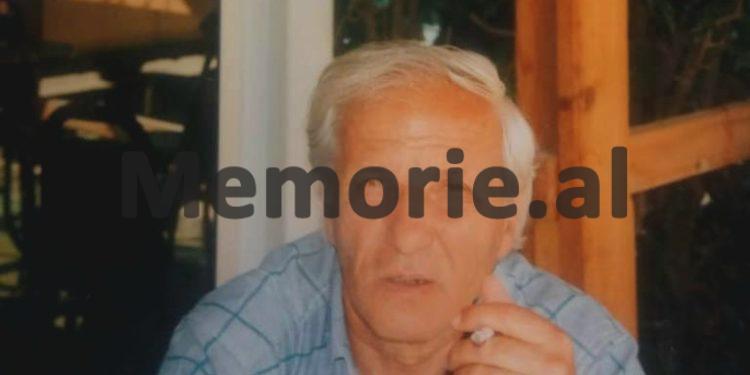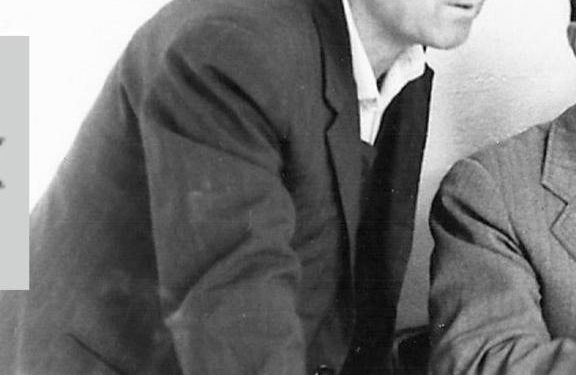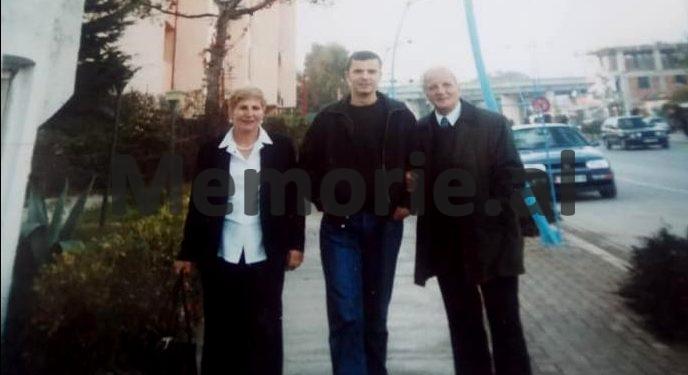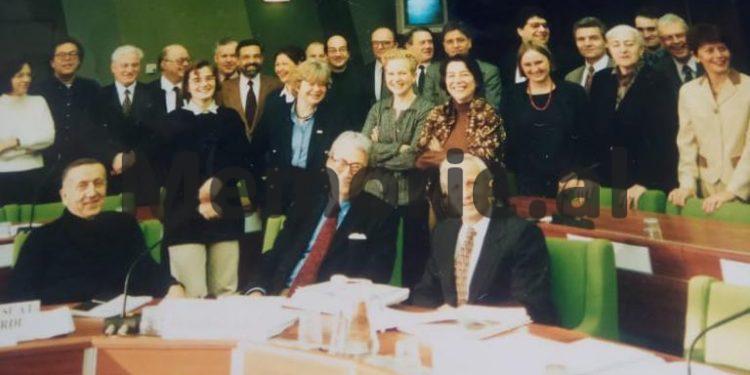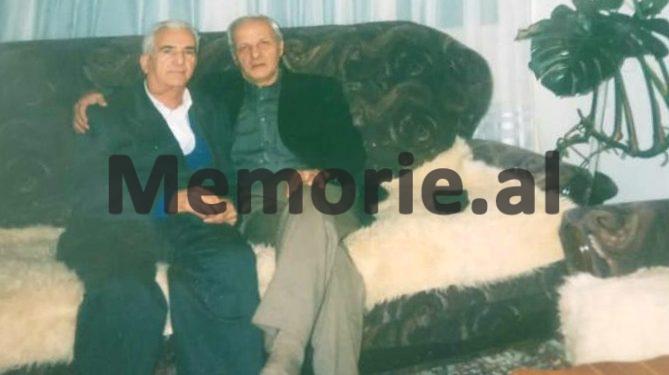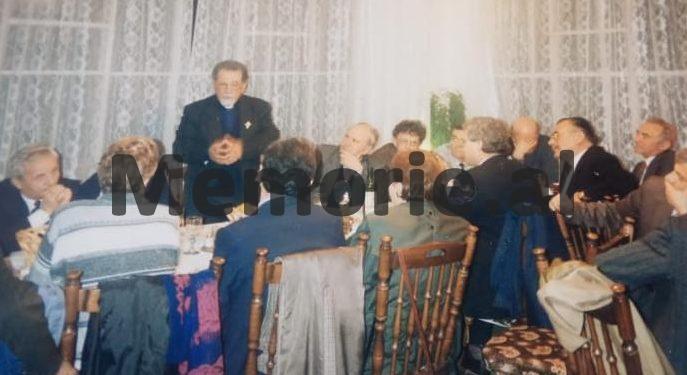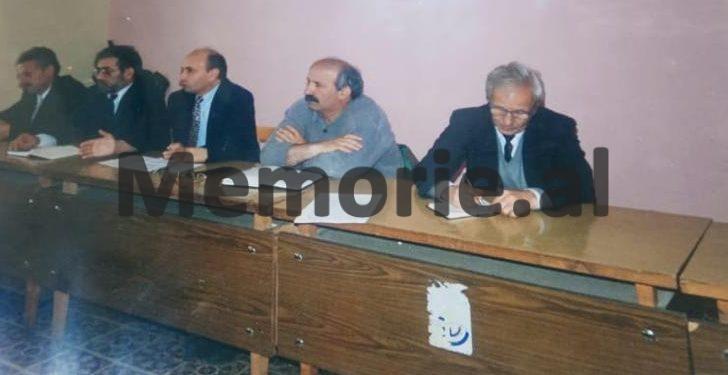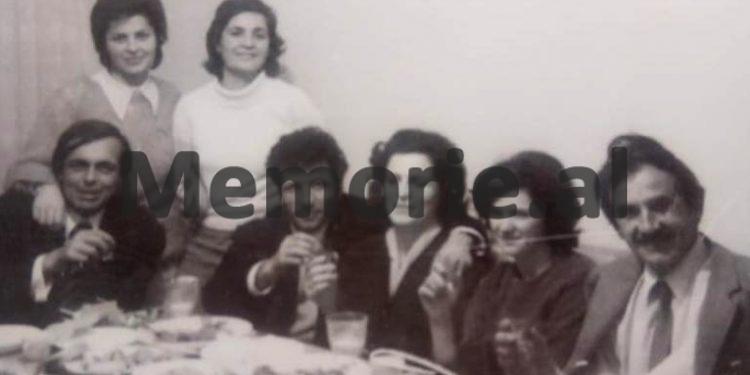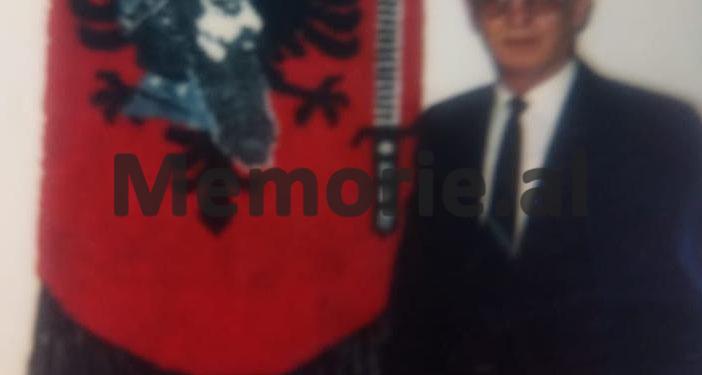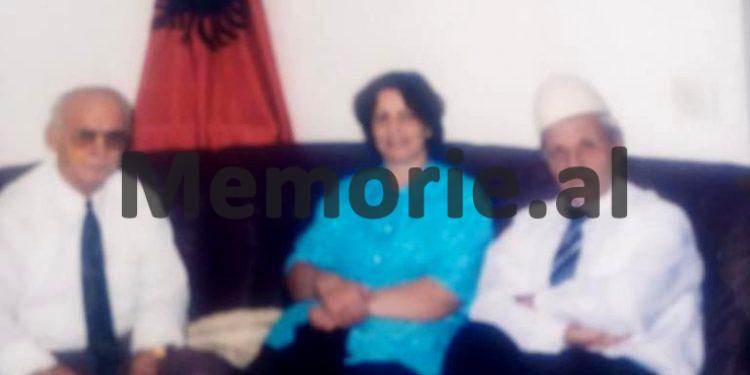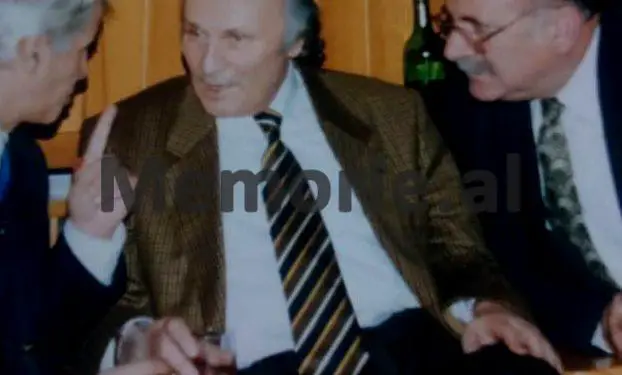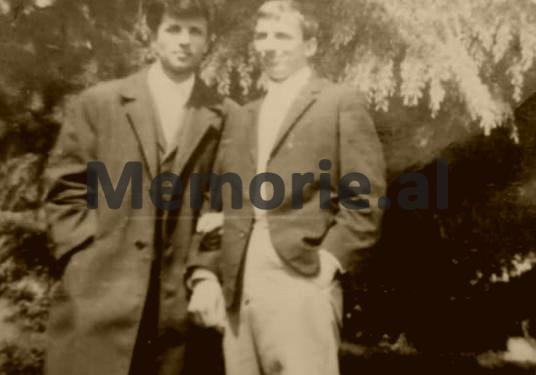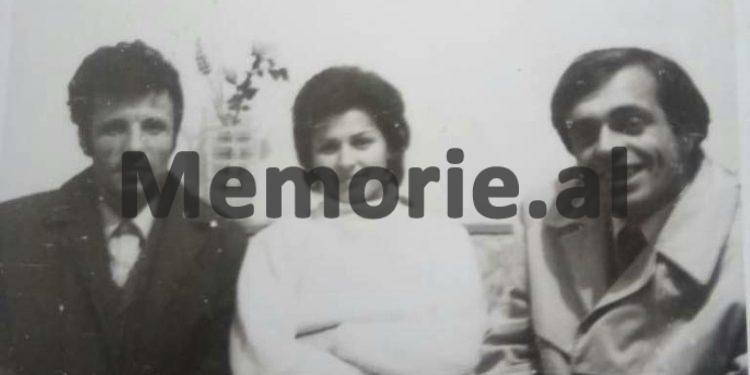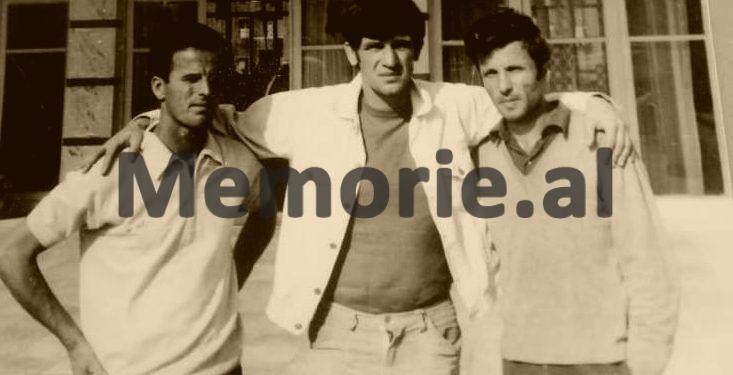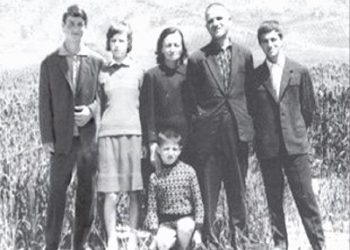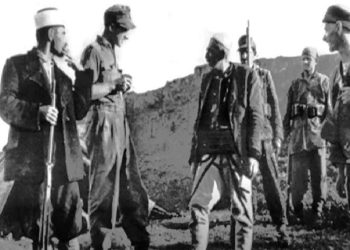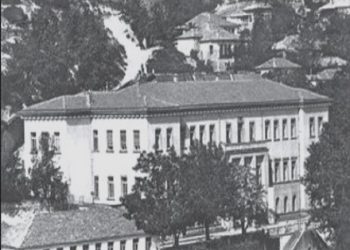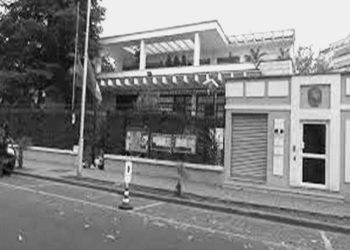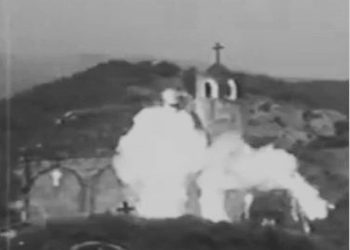Esat Myftari
Part ten
Memorie.al publishes the unknown story of Esat Myftari, originally from Peja, who was in the high school benches when he was a member of a group of young boys who opposed the official Belgrade policy against the discriminatory policy against the Albanian population living in He started working as a journalist at “Rilindja” in Prishtina, from where he was proposed as a correspondent of the TANJUG Agency, but he refused and in 1963 he was forced to flee and come to Albania, with the aim of seeking help and support. from the mother country, for the clandestine organization of the “Boys of Peja”. Numerous vicissitudes in the mother country and continuous pursuit of the State Security since the time of studies in Tirana and the period when he served as an educator in the town of Shengjin and the villages of the Coast Matë, where he was arrested in 1975, after he had officially requested repatriation to his homeland Kosovo, sentencing him to ten years in prison on charges of “agitation and prop agenda ”, which he suffered in the Spaç camp. The whole painful story of the journalist, publicist, researcher, translator, MP and diplomat, Esat Myftari, is described with a literary mastery in his book, “Your death, my life” an autobiographical novel that has just come out from the Publishing House “Lena Graphic Desing” of Prishtina, and with the permission of the author, will be published in parts by Memorie.al
The unknown story of journalist, publicist and writer Esat Myftari
Esat Myftari was born on June 16, 1940, in the city of Peja in Kosovo, where his family originally came from. He completed his first elementary school education, 7-year-old and high school, in his hometown, completing them in 1959. Also, in 1959, Esat, a 19-year-old boy, began his studies at the Faculty of Law of the University of Belgrade. A lover of history and literature, he started writing at a young age when he was in the 7-year school benches and in the faculty period, he became a member of the Literary Club “Përpjekja” based in the City of To the student of “New Belgrade”, where he is affirmed quickly and from time to time, he writes poems and critical literary views, but due to their content, he does not send them for publication.
In 1961, after successfully passing the relevant competition, Esat started working as a journalist in the daily of the province of Kosovo, “Rilindja”, where he is assigned to cover the chronicle of the city of Pristina and the Kosovo Trade Unions. In the same year, he was offered a qualification scholarship at the Yugoslav TANJUG Agency, with the prospect of becoming a correspondent outside the then Yugoslavia. But his joy at the qualifying scholarship that was destined to send him abroad was quickly dashed, as the specialization offered to him was conditional on his membership in the Communist League of Serbia, which 20-year-old Esat refused. categorically.
Meanwhile, in 1963, he participated in a group of young men who disagreed and were against the policy pursued by official Belgrade towards the Kosovo Albanians and wherever they were in their lands under Yugoslavia, and on behalf of the “Peja Clandestine Group”. , as their representative, crosses the border illegally and comes to Albania. Esat’s goal as a representative of the “Illegal group of boys of Peja”, was to establish contacts with the Albanian state and to seek various support and assistance for the well-functioning of that group of young boys, which aimed to resist the discriminatory policy of official Belgrade to the Albanian population in Yugoslavia.
In 1974, some members of this group were arrested by the official authorities of the Yugoslav Ministry of Internal Affairs, accused of participating in the events of 1964, when the Albanian national flags were unfurled in the main cities of Kosovo and when they were taken strict police and judicial measures against them. The main motto of this mass movement, which was the first of its kind in post-war Kosovo, was the unification of Albanian lands with their “mother” state, Albania.
Meanwhile, Esati, who was in Albania, as well as some of his Kosovar emigrant compatriots in Albania, gained a right to study and in 1965, he began his studies at the Faculty of Natural Sciences in Tirana, in the “Bio-Chemistry” branch. After the third year of studies, disappointed by the official policy of the communist regime of Enver Hoxha and the treatment of Kosovar emigrants in Albania, who upon their arrival in their homeland, it seemed that “from the rain they had heavy hail”, interrupts his studies and requests repatriation!
Of course, this was not approved by official Tirana and in 1969, Esat started working as a teacher in the 8-year school in the town of Shengjin, in the district of Lezha, where he worked until 1974, from where he was transferred to the village of Tale. of the Mata Coast, where he also worked diligently. As during his entire period of work and residence in the district of Lezha, Esat was regularly monitored by all means by the State Security organs, even in the school where it was said that he had been sent on purpose, as they feared an escape from his opportunity to go to Yugoslavia from Shengjin, he is arrested and sentenced to 10 years in prison, accused of “agitation and propaganda against the popular power”!
After serving his full sentence while serving his sentence in the Spaç camp, etc. (not benefiting from any reduction of the sentence), Esat was released from political prison in 1985 and returned to the district of Lezha where had worked and lived before the sentence and in 1986, he started working as a worker in the Paper Factory in Lezha. That same year he started a family and then two sons were born.
In 1990, at the beginning of pluralism, Esat took an active part in the popular movements for the overthrow of the communist dictatorship in Albania and with the establishment of the branch of the Democratic Party for the district of Lezha, at the beginning of 1991, for his past and contribution. great at the beginning of those popular protests, he is elected secretary of that branch.
Also, as a result of that contribution, in the first pluralist elections of March 22, 1991, Esat was elected a member of the Democratic Party in the People’s Assembly, representing the voters of the Mata Coast, where he had worked as a teacher until the day of his arrest in 1975.
A year later, in the autumn of 1992, he was appointed Director of the Diaspora Directorate at the Ministry of Foreign Affairs of Albania, headed by the Minister, Alfred Serreqi. In that position, Esat worked diligently until 2000, when he was appointed diplomat at the Albanian Embassy in Riyadh, where he remained until his retirement.
Since that time, Esat has been devoted to his passion, writing, studies and translations and since 2011, he has started publishing several books, which have been welcomed by critics and readers, also because of their subject matter, as well as the variant of Gegërisht that he wrote them, which is very rare in Albanian publications of the mother country!
The first book published by Esat Myftari is “Emrush Myftari” (monograph), and after him come: “Kosovo and Enver Hoxha” (study), “Political profile of Esat Mekuli” (monograph), and “Your death, life ime ”, which is an autobiographical novel, where he has skillfully and chronologically described most of his life, from family and life in Kosovo as a high school student, escape to Albania, many vicissitudes from surveillance of State Security prosecution, arrest, investigation, trial and deportation to Spaç prison.
All the events and everything described in the book “Your death, my life”, are real and the characters there are presented with their concrete names and surnames, while only those people who badly affected his life, (mainly, those of bodies of the Ministry of Internal Affairs of that time, such as operatives, investigators, police officers, heads of the Ministry of Internal Affairs and the Branch of Internal Affairs of Tropoja, Lezha, witnesses in his trial, etc.), the author was has only changed the names, giving them their real surnames.
Continued from the previous issue
Excerpts from the book “Your death, my life”, author, Esat Myftari
The prison barber, unlike the work he did in the city!
b) The day of judgment
Now that the orders were to prepare the defendant for the trial, barber Nasufi appeared in a new light, but completely new. If at first his hand holding the razor resembled a cat’s claw, today she was careful, gentle and almost hid them somewhere on her velvety feet. Ridvan realized that this time there would be no blade left on his face. Besides, unlike other times, when he stood above them silent like a zombie, today he had solved his language and was trying to ask the questions he used to use, outside this environment, when there was a normal human assembly between them. But Ridvani did not respond to anyone, to show that he had not forgotten or forgiven the previous tortures. Ridvan’s eyes were full of contempt for him, so the barber was forced to immediately stop the diarrhea of his own mouth and free gestures.
However, empowered and generously brave, he pulled the small mirror out of his white cloak and, shyly and stealthily, threw it in front of Ridvan. The guard had deliberately turned his back on what he was looking for in the dark corridor.
– Good? he asked in a low voice, scattered and almost extinguished.
Ridvan was certainly curious to see his own image, for until then he had met to be reflected only in the fog of the investigation window. But she was not saying anything accurate, at least he thought so. His face was indeed oval, but not as elongated as the blurring of the glass. But now there was in front of him an almost new mirror, with pristine varnish, so the parable had to be complete and, of course, faithful. It really lacked the light it needed but, anyway, it had to be a real image. He was surprised when he saw with his own eyes that we turned into two small, dim holes, with only a ray of light in them, enough to prove that he was still alive. How much he would like to have a little more clarity in them, even on the condition that the melancholy remains what it was, deep despair.
Because he would find within himself other sources of energy to repel them with the moral strength, he believed he had. It was said that, in his time, Gering did not tolerate the grim faces of the citizens – he was not at all interested in the vital reason for the gloom – but the happiness of the German, his own citizen, he wanted to express openly (similarly he had been told investigator Ridvanit: what did you want to show with that boredom that you spread in the streets of our city, to show that here you were treated badly, that here man has no hope, that here living is for the black page ?!). On the other hand, the cheekbones of the cheeks were showing him out like a half-Mongol, because they had jumped in the foreground and the muscles below them were limping and sliding downwards as if to create the painting of the eve of death. The only part that remained as before were the jaws, as strong and stable as they were, which showed that there was still so much will left that it would not surrender.
He regretted that he would appear before the public with that exhausted and distorted image due to which even his thought, no matter how powerful, would seem alien tajim and, therefore, foreign and not convincing. Or maybe that’s why it would sound more convincing, because it was, she, the body language, that would to help them, which could be understood even by a child and not by adults with such recurring experiences.
After six months, washing with soap would go to trial!
He was told that he would finally, after six months of investigation, be washed with scented soap in order to smell good when he appeared before the audience. That they would give him the clean shirt and pants kept in the warehouse on the day of his arrest to look like he used to – a normal person. But Ridvani did not welcome this great news with joy. Not that he was accustomed to the mold of his clothes hardening with numerous sweaty sediments, but because after such a long time he would find himself naked. It would reveal our hidden savagery of a very cunning outward attack on his body. He also remembered the proverb of his father that he often said to him, especially when he found out about some infidelity of the Serbian government: take care that these, the communists, drink the blood with cotton!
When he was left alone in the toilet and the guard assured him that he could stay as long as he wanted, he first noticed a pink towel that hung on the grave on a black nail, inserted it next to his gray pants shirt and then the water hose that was waiting for him. a black domestic snake, but non-invasive brother with
dungeon horn. He removed his body clothes, pushed them to the corner where the water spray would not reach, and returned to his own body with a terrifying look: his ribs were resembling the keyboards of an old accordion, his muscles were smooth and visible. like fleshy scales that wrapped around him, and his hips were scarred to the depths is the cause of the long supports on the bed planks. Seeing that everything in his body was shrinking and wrinkling and that the signs of premature senility had taken place there, oh my God, forever!
The cold water removed the saora heat of August. For a while I sat motionless, locked and forgotten. Soap fell on himself two or three times, especially the armpits, genitals and soles of the feet. I rinsed it with an almost sensual somewhere. Then he took the towel, rubbed it slowly and nicely, and got dressed. He certainly felt relieved, enlightened, and somewhat reborn. After a while, the court session would come to conclude a chapter of life and to start something else, hopefully something more humane and Albanian.
Win a battle? Yes, we won, because he was facing charges, but he himself had not directed anyone against anyone on this earth and was appearing before the people on the Day of Judgment as he had entered the day of arrest!
It was a joy beyond reason!
Trial development and colleagues from Lezha
Ridvan was placed in the second row of the small hall, on the left wing. He found a few of us scattered around the banks and, at first glance, saw no one he knew. Most likely, they would be from nearby or distant villages. But how he was somewhat comfortable between the two policemen, he was able to grab the whole room with a look: surprisingly, even now he did not distinguish any of Shengjin’s colleagues, with whom he had worked for five good years and he had not bad memories of them. After a few minutes the people assigned to take part in the process were shyly entering and taking their places. Suddenly, Rozi appeared among them, with her beauty on her neck and waist and unmatched by anyone. She sat on the other side, but parallel to her: cold, indifferent to others and with some understandable pride because she had refused to surrender as a witness, as her co-workers had done. No, the man should not be degraded like that, it seemed as if all her stature was speaking. Or more personally: there was no way to desecrate in those religions the shadow of common nights. Rather, she had worn the dress that Ridvan once liked and with this gesture had intended to complement the message of her soul.
The last group of newcomers were mainly teachers of Lezha, with whom he had superficial acquaintances. Meanwhile, the colleagues of the village where he was arrested, will come another way, as supporters of the accusation. They, as the investigator had assured him, would contain the symbol of objectivity. But when he saw the chief investigator and investigator, Ridvan came to rub his eyes. He had not thought under any circumstances that their impudence would reach this point! Meanwhile, whether this step of theirs was explicitly a violation of procedure or not, he did not know for sure, so you do not mind protesting. In the end, the trial panel was introduced.
Everyone got to their feet and silence fell in the hall.
President Flutura Tirana, a lawyer from those stars rising from the working-class sky, had two younger colleagues by her side. These too were from the time of the great program reduction of law, but their education was continuous and regular and they had enjoyed as students a bit of the short liberal spring.
Ridvan was laughing as he followed the mayor’s slow, nasty movements: he simply could not believe his eyes how she could judge him by the narrow horizon he had. He had the opportunity to meet with him two or three times at his friend’s house, when he was working as a teacher. One night they even clashed over Roman law, which she called “archaic remnants”, so she dropped out of the curriculum.
– Yes, it is considered among the basic lands – Ridvani had noticed.
-Those who have decided so, know better than you and me! she replied shortly.
Even in this court hearing they were facing each other as “opposing” parties, but now with a small change: she held in her hand the scepter of power over her.
After the formalities were completed, everyone took their seats.
It was the prosecutor’s turn. They called him Stavri Themeli – they said that he was a sucker of the well-known communist general, who immediately after the war was assigned “to discipline reactionary Shkodra”. But unlike him, he had a nature that was much softer than he was. Ridvani also knew the prosecutor, but from afar. That he used to go to sea regularly with his wife and little girl, but he stayed with them for a while: he liked to walk alone on the shore, to watch the small football matches played in the sandbox or to watch a game of chess somewhere, in a tent case. Enjoyed a little of it all. Not only that, but during his stay in the dungeon, he had once gone to “visit”. He had stood at the door, had his hands on his hips and with muffled words, words that rolled one on top of the other like waves, he had asked him without any investigative wickedness in his face: where did you get the courage to come out against the leader ?!
Ridvani did not respond. It was enough with just a light laugh.
Swarm of witnesses in the courtroom
When the crowd of witnesses entered the hall, they looked confused, as if trying to hide from each other. The rules on the responsibility of their statements were read and, after collectively claiming that their duty was clear, they were taken out, to be introduced during the process one by one. The indictment of the prosecutor more or less said that the defendant had listen to foreign radio stations, mainly Yugoslav ones; that he had spoken out against workers’ control as a means of pressure, even calling his members immoral and clownish; that he had refused to work in the cooperative brigade on the draft constitution on the pretext that he had foreign citizenship; that he had explicitly stated: “if Enver Hoxha leads the campaign for the imprisonment of Kosovars, I declare myself against him”, but not in vain he had uttered the word “if”, as a mitigating condition and the possibility of re- interpretation.
His attitude towards the shooting of the generals was legally called an impermissible provocation, evil and punishable by law, which was done to him by a group of teachers of the Mata Coast teachers, named Toni. In fact, the clash happened as follows: This secretary, aware that during the meeting Ridvani was upset for other reasons, shook the unreadable pamphlet in the collective about the shooting of the generals’ paradoxes and asked him with an irony from power: what do you think about this trial and these traitors? Ridvani, although already caught up in the controversy, did not hesitate to adhere to a dangerous principle for the time being and replied: “In addition, both sides need to be heard in trials.”
That was enough for all those present to be scandalized with his impudent courage to question the justice of the Party, so they were released on a fierce rage! Ridvani had stayed in the frozen place, he was following their gestures with sudden phlegm also for the fact that they were the daughters of the province officially described as the “most reactionary province” of the country, so they were vomiting towards seeing the zeal of the false ones of that day. Even from the observation he was making to the prosecutor’s speech, it was clear that the materials of the popular investigation lacked seriousness: the illogical and comic part of it and the small texts were carefully edited and distributed in other details, without any identity or internal connections.
After all this, it was said in conclusion that Ridvani was a man of foreign dough and as such detrimental to the upbringing of children and to free living among orderly and conscientious people. But even among these listeners, as in the popular investigation, there was a great disappointment, because they had come with great eyes: they had come to be acquainted with extraordinary facts, which limited to espionage, since the campaign against him during the investigation had been very offensive and the fact that he had sought repatriation had sparked the fantasy of a good part. While the arguments that were being mentioned there were the secret and everyday language of every citizen with two strands of mind and dignity, a language that was spoken in the houses by themselves, but without guests and camaraderie on foot.
The colleague who denied the statement against Ridvan issued to the investigator!
After that, the court summons, a middle-aged man, began to bring in one of the witnesses waiting in the mise-en-scène.
But the one who caused the commotion was teacher Pjetër Luli. He denied the statement issued to the investigator and began to angrily oppose the investigator’s stylizations.
– Aha – said Peter – now I understand why he wrote my accusations in very rare lines, of course to insert his additional words between them after receiving my signature!
The noise of those present was heard in the hall. Ridvani turned his head towards the investigator, who, huddled in the corner of the room to catch the eye as little as possible, was a narrow fairy and had no way of intervening. But the mayor hurried to close the scandal and gave the order to expel the defamatory and uneducated witness. After this unheard-of case in that new court, the other witnesses came wise and reciting, uninterrupted by anyone.
When Ridvan was given the floor, he felt empowered because he had discerned many weak points of the accusation. And it started from Peter’s case to “deconstruct” the morale of the investigation. But no, they did not. From the end of the hall, where the chief investigator Gjoleka was sitting, came a white envelope that was handed over to the chairwoman Flutura Tirana. She hurriedly opened it and as she read it, interrupted the defendant and ordered in a stern voice:
– We did not come here for counter-propaganda. The trial panel withdraws for decision.
As the jury withdrew to its chamber, Ridvan was dragged out of the hallway in handcuffs and ordered to sit in a chair. The policeman stood by his side without seeing the light of the policeman, especially after that session which turned out to be completely disfigured and out of order. Several children aged 12-13 had gathered in the stairwell and were not taking their eyes off him. Ridvan simply could not believe how the last bit of judicial solemnity was crushed in this kind of religion.
He was watching these curious children as well as the slightly stunned – arguably the most sensitive part of all who had been in the hall – who understood very little of this fuss and play. These children had before their eyes a weary man, whom they could not even determine their age, but who seemed to be an old man without a man, and they abandoned them only in the force of their word, which cut him in half. And they were wondering how when they were down the stairs and, on the street, and the speaker was spreading his word, they had the illusion that a much younger, more powerful and combative man was speaking, though, most of his words he did not even speak. had understood.
Among them, the word Kosovo was heard several times, but for them it was a foreign name, cold, without interest, even with a cultivated hatred for him. The rest of the audience either remained in the hall – the envelope indicated that the decision was predetermined and would not be delayed – or came out of the other side of the hall, so as not to be watched.
Ridvani had read Kafka’s trial since he was a student. He had also browsed Brodsky’s critical notes, but had always had some reservations and thought that, in essence, the book was a hyperbole, very useful for figurative meanings, but not a piece of living life. The knife that was stuck in Josef K. on the stone near the cave and that was used twice in his heart, left the impression of a theater more than life. Only now was he realizing that the crimes that take place in these environments, in their real time, would probably have been like this at all times. The comrades of the group who had gone through such trials in Peja also came to mind and remembered the statement of the well-known Bosnian judge, Omeragic, who, addressing the youth present in one of the trials there, had stated opened and with full conviction: “If I were asked, I would pave the road to the border to pave the boulevard, but on the condition that they would not be allowed to return to Kosovo. That our hand has been there for a long time!” Who knows, Ridvani judged on his own, as he waited in the hallway and recalled some frightening encounters, the day would come when he would sit down with his friends to exchange some details of their investigators. Only then could the conundrum of their youthful failure, with which they aimed to bring the Serbian beast to the ground, be built accurately and without great flaws.
Trial decision for Ridvan: ten years in prison
After returning to the courtroom, the trial panel and those present stood up, the presiding judge, Flutura Tirana, read the decision by which Ridvan Myftari was sentenced to 10 years of imprisonment and confiscation. He read the decision quickly, as if someone was following him, and immediately left without looking sideways.
Ridvani laughed and said: ten years he will tread like flies!
The public honored him by standing for a while and in complete silence, and this was the greatest reward he received that day from that environment.
The car with the open spond was waiting for him downstairs, the same one with which he had been brought to court. We smeared it with closed green paint and muddy tires. Two powerful policemen grabbed him by the arms like a straw scarecrow and put him on the bench behind the driver’s cab. A good portion of the audience had decided not to leave without starting the car. And at one point, when her attention was lost somewhere far away, from the crowd she broke her own path – Rozi, opened her handbag and from there took out four packs of cigarettes and threw them at her feet and stood in front of her in a straight, chest-standing position. bring forward and challenging. But no one intervened, nor rebuked him. They laughed at each other and she seemed to want to say something, but immediately the roar of the engine and the smoke of the exhaust fell on them. People were marginalized. The car took the road to prison.
They slammed him in the chest, where he found three other ordinary convicts. Each with their own banal stories, but now closed, as well as his own.
After an hour, the door was opened and Gjoleka was handed over to the investigator with his innate irony, but this time they were stripped of the bully’s chest and devalued by that unprecedented intervention in the courtroom.
– You can appeal against the decision in the High Court within 5 days from the announcement of the decision – he said with a look that made his face look ugly.
Ridvani laughed.
– I will not complain.
– Then sign that you refuse to complain.
Ridvan signed and rejoiced that his hand did not tremble, though the waves of disgust were rising inside.
– I knew – said the chief investigator and, when you left, he added with the greed of the cop – because you are aware of your guilt!
After being released, Ridvani picked up and opened a cigarette case – the most expensive gift of his life. When he opened it, he saw that his and Rozina’s names were engraved on the cigarette polish! A sledgehammer was tied around his neck and he let go of both his hands and slammed it on his knees. No, Albania has no blanket! – cried with his mind to the cup of heaven. Perhaps even she herself would never have understood what that gesture of hers meant for the symbolism of his upbringing at that moment of heartbreak!
At the bus stop waiting for the bus?
He met Ridvan for a full week, waiting for the bus. During those long days he heard a series of events from the life of the Albanian underground: the way the brothers acted, the thieves’ fine collaborations with the police, the division of Albania into operational areas according to the psychology and mentality of the locals and, in rare cases, the mediator’s story. intrigue about the female world. During our time, none of them showed the slightest curiosity to know what had pushed Ridvani to deal with such ridiculous work as that of a certain Albanian province to remain under Serbian occupation, or some freedom abstract that I was loving the mind of the Albanian soul.
Finally, the green car of the day of judgment came and took it to its destination. When he was crossing the Mirdita Valley, with Rocky Mountains on the side, he was feeling a strong pain as if the foundations of his grips were being shaken: these faces we said like crowns, this nature stripped him and these lines
of dogmas hardened, it seemed as if dictated everything. Maybe even the Political Evil. The self was looking like a ghost, without a flag and muscles.
And, after scanning for the seventh time in his life, Ridvani came to the conclusion that his arrest and conviction was not so absurd as to be marked by the popular expression “fell in, for a word of mouth!”. In the conditions of dictatorship, it was seen that he had really been a foreign meat to, as such, had to be isolated. And, if it were to be extinguished there, in the camp, it would be the fault of its tissues with which it was built in its reactionary Kosovo, because the progressive Albania had to remain lame, dirty – Vjose! Therefore, it was not surprising that Kosovo was sometimes seen as a tribal victim, sometimes as a Trojan Horse that had to be hit mercilessly; why the Kosovar political refugee was sometimes advertised as a hero, sometimes as a traitor.
It was a fantastic math that amazed many.
Towards Spaç camp to serve the sentence?
Ridvan was being taken to the Spaç camp, and he was nurturing the fearful hope that there he would find the homeland of forbidden books, betrayed dreams, twinkling hopes and intellectual vision, which had to stand afloat in pristine air. and as divine promises.
Or even that openness would turn into a new disappointment?! And if this were to happen, would there be a season to continue its pilgrimage illusion after illusion? He recalled the adventure that happened to Kërlezhë in his youth: inspired by Shtrosmayer with friends on the unity of the South Slavs, he bravely set out for his Piedmont – Serbia, but as soon as he came out of the Danube he was captured by the Serbian coast guards , who, in order to erase any stain of their spoiled soul, had locked him in a dungeon on the charge of being an Austrian spy.
That then Ridvan would have no choice but to seek final displacement into space and be immortalized as a particle that would willingly join any planet./ Memorie.al




